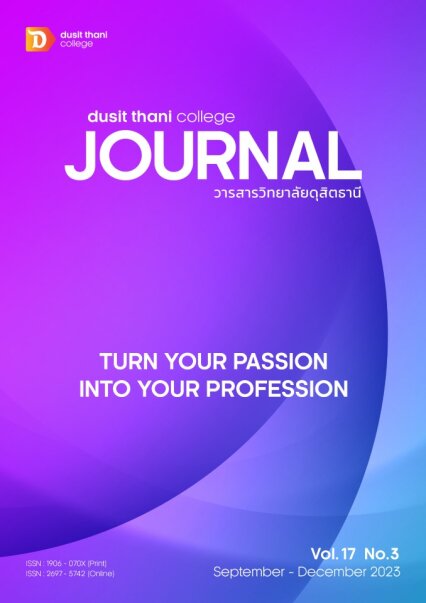The Concept of Metaverse Using in Teaching Culinary Arts
Main Article Content
Abstract
Metaverse concepts are playing a role in the daily life of people in various circles. In education, the concept of using metaverse in instructional design of teaching and learning for students have been discussed in both theory and practical classes. The Culinary Arts is one of the subjects that emphasizes on practical class and has potential to use the trends of metaverse to help support teaching and learning in order to achieve the effective learning outcome for learners.
Objective of this study is to collect data that has been collected from the web-based recipe learning questionnaire about the trend of using metaverse in teaching and learning Culinary Arts, the respondents found that it is an interesting development if it is going to be used in conjunction with web-based recipe learning. The result of questionnaire shows that various forms of AR technology received more attention from respondents than VR technology, and more suggestions on improving teaching and learning with metaverse technology that Culinary Arts support program should be designed to help with the revision or to show the sequence of cooking methods prior to the actual practical class since it not only provides more information about each ingredient used in each recipe, but also a simulated content of the ingredients. It can also be provided in the form of a virtual encyclopedia. If such program could further interact with the learners by using artificial intelligence or by way of the synchronous teaching, it will receive more attention from the user.
Article Details

This work is licensed under a Creative Commons Attribution-NonCommercial-NoDerivatives 4.0 International License.
Article Screening Policy
- All research and academic articles to be published must be considered and screened by three peer reviews in the relevant field / article.
- All articles, texts, illustrations and tables published in the journal are the personal opinions of the authors. Editors don't always have to agree. And no responsibility whatsoever is the sole responsibility of the author.
- The articles to be published must never be published. Where did you first publish? And not in the consideration of other journals If the audit found that there has been a duplicate publication It is the sole responsibility of the author.
- Any article that the reader sees as being plagiarized or impersonated without reference. Or mislead the work of the author Please let the journal editor know it will be your greatest blessing.
References
Adedoyin, O. B., & Soykan, E. (2020). Covid-19 pandemic and online learning: the challenges and opportunities. Interactive Learning Environments, 1-13.
Mulyatiningsih, E., Palupi, S., Ekawatiningsih, P., & Firdausa, A. R. (2021). The Characteristics of Enjoyable Online Learning for Culinary Arts Student. arXiv preprint arXiv:2107.14043.
Wang, C. Y., & Tsai, M. J. (2017). Students’ self-efficacy and attitudes toward web-based recipe learning in Taiwan culinary education. The Asia-Pacific Education Researcher, 26(3), 193-204.
Sharka, R., Abed, H., & Dziedzic, A. (2020). Can Undergraduate Dental Education be Online and Virtual During the COVID-19 Era? Clinical Training as a Crucial Element of Practical Competencies. MedEdPublish, 9.
Durand, M. D. T., Restini, C. B. A., Wolff, A. C., Faria Jr, M., Couto, L. B., & Bestetti, R. B. (2019). Students’ perception of animal or virtual laboratory in physiology practical classes in PBL medical hybrid curriculum. Advances in physiology education, 43(4), 451-457.
Vrigkas, M., Lappas, G., Kleftodimos, A., & Triantafillidou, A. (2021). Augmented Reality for Wine Industry: Past, Present, and Future. In SHS Web of Conferences (Vol. 102, p. 04006). EDP Sciences.
Sukiran, S. R., Ismail, I. M., Halim, H., Ismail, M. E., Amiruddin, M. H., & Razali, N. (2018). THE ASSESSMENT OF THE EFFECTIVENESS OF PRACTICAL COOKING HANDBOOK BASED ON AUGMENTED REALITY APPLICATION IN DOMESTIC SCIENCE. Human Sustainability Procedia.
Chicchi Giglioli, I. A., Bermejo Vidal, C., & Alcañiz Raya, M. (2019). A virtual versus an augmented reality cooking task based-tools: a behavioral and physiological study on the assessment of executive functions. Frontiers in psychology, 10, 2529.
Aguilar, J. G. S., & Aguilar, I. A. (2019). Interactions between human, computer and food. Food Nutr OA, 2(2), 116.
Ratan, R. (2021, October 30). What is the metaverse? 2 media and information experts explain. Encyclopedia Britannica. Retrieved from https://www.britannica.com/story/what-is-the-metaverse-2-media-and-information-expertsexplain
Lowood, H. E. (2021, May 13). virtual reality. Encyclopedia Britannica. Retrieved from https://www.britannica.com/technology/virtual-reality
Hosch, W. L. (2021, February 11). augmented reality. Encyclopedia Britannica. Retrieved from https://www.britannica.com/technology/augmented-reality
Squires, D. R. (2014). M-Learning: Implications in Learning Domain Specificities, Adaptive Learning, Feedback, Augmented Reality, and the Future of Online Learning. Journal of Educational Technology, 11(3), 1-8.
World Health Organization (2021, October 1). Advice for the public: Coronavirus disease (COVID-19). Retrieved from https://www.who.int/emergencies/diseases/novel-coronavirus-2019/advice-for-public
Costley, K. C. (2014). The Positive Effects of Technology on Teaching and Student Learning. Online submission.


